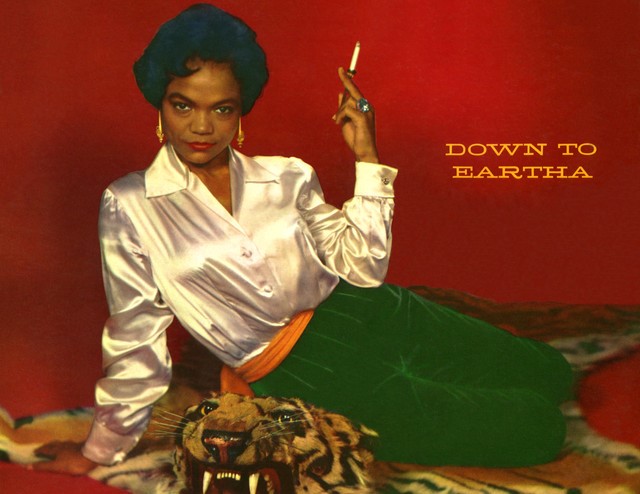Matriarchs of Music: Eartha Kitt
January 3, 2023
When she died at the age of 81 on Christmas Day 2008, there was practically nothing that Eartha Kitt hadn’t done. While this series is called Matriarchs of Music, music only scratches the surface of her life.
While she was an accomplished recording artist, including the holiday classic “Santa Baby,” she was on Broadway and also appeared in movies and on television. From her early days in Harlem to her resurgence among young fans as conniving animated villain Yzma, Kitt spent decades in the cultural zeitgeist.
Born in South Carolina in 1927, Kitt did not know her exact birthday until later in life and never knew her father. According to The Guardian, when she found her birth certificate in her seventies, her father’s name was crossed out. Being mixed race in South Carolina gave her a troublesome childhood. Her white father was gone, and she and her Black and Cherokee mother faced many hardships. Her mother died when she was young, so she was sent to New York to be with relatives.
Having lived in Harlem for a few years, Kitt joined a dance troupe at the age of 16. She toured the world with Katherine Dunham, whose dance career focused on African American and Afro-Caribbean dance, according to her school’s website. Kitt toured for several years and then stayed in Paris to be a singer.
She moved to Broadway in the ‘50s. Around the same time, she started recording music and created one of the most popular Christmas songs ever made, “Santa Baby.”
“Santa Baby” was very unique for its time, to say the least. Christmas songs were for the Bing Crosbys and the Frank Sinatras, and they were for gathering around the radio and re-enacting a Norman Rockwell painting with your family. Many songs were religious, the secular ones were silly little tunes with jingle bell backing. “Santa Baby” is indeed very silly, it joined a growing collection of novelty Christmas songs that were popular at the time. What made it different was that… Santa was sexy?
The songwriter, Phil Springer, told the Los Angeles Times in 2017 that he does not know why people would want a song about a sexy, sugar daddy Santa. The song was written quickly and he thought it would not be a good addition to the rest of his songwriting catalog. Additionally, he wasn’t sure if Kitt — best known then as a sultry Broadway performer — would be the best vehicle to sell a song for a family-oriented holiday. Depending on the region, it wasn’t. It did give RCA one of its most successful years, but it was also banned in some parts of the United States, particularly the South.
Regardless, it has continued to be a timeless classic, both the original and covers remaining popular 69 years later. Outside of seasonal favorites, Kitt became a popular recording artist. Albums Down to Eartha and That Bad Eartha brought her success in the ‘50s.
In 1967, she entered a new medium. Despite only playing the character for five episodes, her portrayal of Batman villain Catwoman has become legendary. In a time with very few Black actors appearing on the nation’s television sets, TV Guide writes, Kitt’s character was a source of empowerment during the height of the Civil Rights era. She brought new life to the show; she gave the villain a complexity and a spunky, sharp-tongued sensual portrayal that audiences loved.
However, just a year later, it would all come crashing down. In January 1968, she was invited to the White House to discuss the issue of juvenile delinquency with President Johnson, the First Lady and some others. Kitt was suspicious and didn’t want to go, recounts the Washington Post. Of course she went, and realized that this meeting wasn’t going to cause any real change. She confronted LBJ and his wife Lady Bird directly, asking them why they weren’t doing anything to poverty and the juvenile delinquency this luncheon was supposed to be about. More consequently, she criticized the Vietnam War, vocalizing the concerns of many Americans; the war was immoral and had needlessly killed swaths of young men. She condemned the Commander in Chief for his actions, and in turn, her career in America screeched to a halt. All of her bookings and tours were immediately canceled and she could only find work in Europe. She also had a CIA file opened on her.
In a 1978 interview, a few years after having seen this dossier the government had opened on her, she says that the president personally called media outlets across the country and said he didn’t want to see her face. When interviewer, television host Dick Cavett, recalled how the dossier called her a “sadistic nymphomaniac” and “shallow,” she literally purred in response. She did the interview to promote her first appearances in America in a decade, Broadway musicals Timbuktu! and an all-Black production of Kismet.
Eartha Kitt had regained the public’s favor and was back and better than ever. She released a couple of live albums and began starring in an array of film and television projects, according to TCM. In 1984 she released the album I Love Men, which was a disco album. The album reached moderate success on the charts.
She was a philanthropist and an advocate. In a 2006 interview with the Windy City Times, she said that the gay community helped keep her name alive in the U.S. after she was blacklisted. She further explains that she empathizes with them and their struggles because she also knows what it is like to be cast out by society. After traveling the world, Miss Kitt established the Kittsville Youth Foundation Dance & Cultural Arts Program in 1965 out of frustration due to the lack of resources for children growing up like she did.
The ’90s continued on in the same fashion, with movie and television appearances, albums and tours. In 2000, she gained popularity with a younger audience in Disney’s The Emperor’s New Groove, providing the voice for the villain Yzma. She brought both humor and wickedness to the role that is irreplaceable and unforgettable. Unfortunately, she did have a song in the movie that ended up being cut. She won two Daytime Emmys for reprising the role in the series spinoff television series.
It was one of the last things she did after decades in showbusiness, and she died on Christmas Day 2008. Whether it was entertaining thousands on a Broadway stage, seducing Santa or playing the scheming villain, there’s nothing that she couldn’t do without absolutely, completely perfecting it.
In a clip from her 1982 documentary, All by Myself: The Eartha Kitt Story, she is asked if she would ever compromise herself, for a man or otherwise. “What is ‘compromising?’” she asks the interviewer, before laughing and calling it stupid. She never did compromise. She was always authentically herself, not caring what anyone thought.































